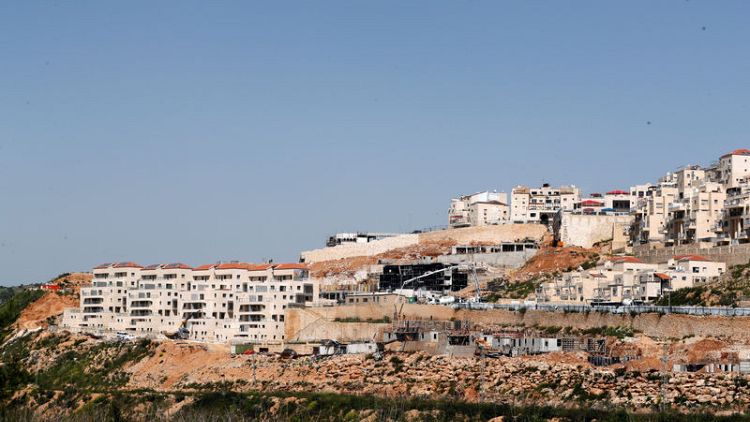By Jeffrey Heller
JERUSALEM (Reuters) - Palestinians voiced alarm while Israelis weighed the gravity on Sunday of Prime Minister Benjamin Netanyahu's sudden election promise to annex Jewish settlements in the occupied West Bank.
Some Israeli commentators saw the right-wing leader's pledge on Saturday, as Tuesday's national ballot approaches, as mainly a bid to siphon votes from ultranationalist rivals long advocating annexation.
But after years of resisting far-right calls to formally put West Bank land captured in the 1967 Middle East war under permanent Israeli hold, Netanyahu could be counting on support for a dramatic shift from his close ally, U.S. President Donald Trump.
"Who says that we won't do it? We are on the way and we are discussing it," Netanyahu, asked why he had not extended Israeli sovereignty to large West Bank settlements, told Israel's Channel 12 News.
In March, Trump broke with decades of international consensus by recognising Israeli sovereignty over the Golan Heights, territory Israel captured from Syria. That followed his December 2017 recognition of Jerusalem as the capital of Israel, and the U.S. embassy's move to the holy city last May.
Asked in an interview on Friday on Israel's Channel 13 why he wasn't pressing Trump now to approve a West Bank settlement status change, Netanyahu replied: "Wait until the next term."
Taking Netanyahu at his word, Palestinians seeking statehood in the West Bank, Gaza and East Jerusalem called his settlement annexation remarks a violation of international law regarding occupied territory.
"His declaration is not just in the heat of ... electioneering campaigns," said Hanan Ashrawi, a Palestine Liberation Organization official. "This is the end of any chances of peace."
A spokesman for Hamas, the Islamist militant group that runs the Gaza Strip, said "the response to (Israeli) crimes and foolishness will be met by popular resistance, armed resistance and by all our might".
But Israeli Education Minister Naftali Bennett, head of the New Right party and author of a plan to annex parts of the West Bank, suggested Netanyahu was simply trawling for votes.
"For the past 10 years, Netanyahu has blocked applying Israeli law to even a centimetre of land," Bennett tweeted.
In the settlement of Karnei Shomron, spice shop owner Yehezkel Shaul said he believed Netanyahu's annexation pledge, calling him "the most reliable and honest person".
At the local high school, Harel Levi, 18, was not so sure.
"It's an election promise and he'll find some excuse later," Levi said.
HEATED ISSUE
Settlements, which Israel's B'Tselem rights group said cover about 10 percent of the West Bank, are one of the most heated issues in efforts to restart peace talks, frozen since 2014.
After decades of settlement-building, more than 400,000 Israelis now live in the territory, according to Israeli figures. The West Bank is home to some 2.9 million Palestinians, the Palestinian Statistics Bureau says.
A further 212,000 Israeli settlers live in East Jerusalem, according to the United Nations Office for the Coordination of Humanitarian Affairs.
The Palestinians and many countries consider settlements to be illegal under the Geneva conventions, which ban settling on territory occupied in war. Israel disputes this, arguing that the status of the West Bank is still disputed. But unilateral annexation would be far harder to justify, even among allies.
Trump's predecessors as president publicly discouraged the expansion of settlements, arguing that they made it harder to negotiate a viable Palestinian state, viewed by administrations from both U.S. parties as Israel's likeliest route to peace.
Palestinians argue that Washington did not do enough in practice to press for settlements to be curbed.
Most peace plan scenarios foresee Israel negotiating to keep some settlements in return for giving other land to the Palestinians. Annexation could take that off the table.
Netanyahu's annexation promise was met with scepticism by Shaqued Morag, director of Peace Now, an Israeli anti-settlements group that closely monitors their expansion.
"So we must ask, why has Netanyahu said this now?" Morag said. The answer, she told Reuters, was that Netanyahu feared for his political survival and "the times dictate he makes these extreme declarations that he has no intention to follow through on".
Israel Katz, the acting foreign minister and a member of Netanyahu's Likud party, said its "great fear" was a split in the right-wing vote that would result in a second-place finish behind the centrist Blue and White faction.
Katz said Likud had to ensure it emerges as the biggest party, to put Netanyahu in the best position to get the nod from Israel's president to try to put together a governing coalition. No one party has ever won a ruling parliamentary majority on its own in an Israeli election.
(Additional reporting by Ron Bousso in Karnei Shomron, West Bank, Ali Sawafta in Ramallah, West Bank and Maayan Lubell and Stephen Farrell in Jerusalem; Editing by Peter Graff)
